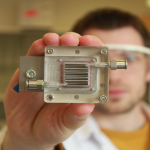 A recent report from the World Health Organization found that more deaths are attributable to air pollution in the UK than pretty much any other country in Europe. For anyone that’s walked around London it’s perhaps easily understandable. It coincided with a study from Surrey University that suggested hedges are actually better pollution catchers than trees.
A recent report from the World Health Organization found that more deaths are attributable to air pollution in the UK than pretty much any other country in Europe. For anyone that’s walked around London it’s perhaps easily understandable. It coincided with a study from Surrey University that suggested hedges are actually better pollution catchers than trees.
“The emissions from vehicles start to dilute very quickly as you move away from the road, so any hedge that acts as a barrier slowing down the airflow and catching pollutants on the leaves is going to offer people in homes better protection,” the researchers say.
Of course, in addition to such natural remedies, researchers are also coming up with rather more high tech solutions. For instance, a team from the University of Antwerp and KULeuven are developing a handheld device that aims to purify air whilst energy is recovered.
All it needs to work is to be exposed to light, with air parsed through a membrane into two chambers, with purified air on one side and hydrogen gas on the other. This gas is stored and used for fuel. The hope is that the device helps not only to clean the air, but also to provide a clean source of alternative energy.
Cleaner air
Of course, this isn’t the only interesting project hoping to make our air cleaner. For instance, a few years ago the University of Engineering and Technology in Peru developed a billboard that could purify air.
Lima is already a city with heavy air pollution issues, but with building work being done on a new university campus, the area is heavily polluted. Thus, the university decided to put their brains to the task and come up with the air purifying billboard that they claim will have the same impact as a 1,200 tree forest.
The billboard features low-power equipment that sucks in polluted air from the surrounding environment, before filtering the air through water and then pumping it back out into the local environment. It’s a pretty neat project from an organization with form in this area, as previously they created a billboard that captured humidity from the air and turned it into drinkable water.
It’s not clear just how receptive the market has been to the idea, but air pollution remains deadly in most of our urban areas, so innovations like these are long overdue.